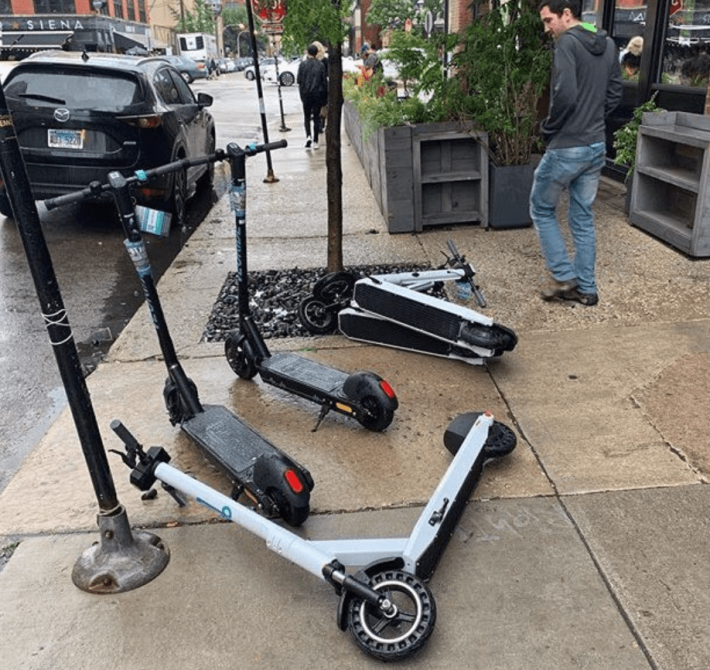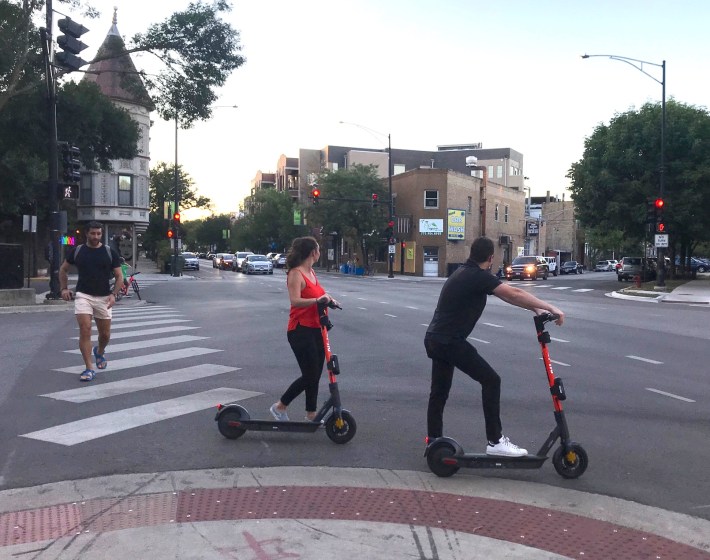Last year during Chicago's first dockless electric scooter pilot, the satirical Twitter account Chicago Fails tweeted out countless photos of e-scooter misuse, including the gadgets strewn across sidewalks, thrown in garbage cans and dumpsters, or even hanging from trees. The images were amusing, but sidewalk clutter -- especially when it impacts people with disabilities -- and vandalism eyesores are no laughing matter. There was even a case last year where someone dropped a scooter from the Bloomingdale elevated trail, smashing a car's sunroof. It all served to prove the principle that it's not a great idea to have mid-weight objects unsecured in public space, where anyone can knock them over or pick them up and misuse them.

That's why Streetsblog Chicago advocated for having a "lock-to" requirement for scooters, with built-in locks for securing the devices to bike racks, sign poles, and parking meters. The city implemented that strategy, and for this year's pilot all the scooters from the three concessionaires, Bird, Lime, and Spin, have built-in cable locks. As a result, Chicago Fails hasn't had much to tweet about scooter-wise this summer. Scooter-blocked sidewalks and trashed e-gadgets have pretty much gone the way of the dinosaur in Chicago.

The obvious downside of the lock-to strategy is that scooters are taking up space on our city's limited number of bike parking fixtures, and that really annoys some local cyclists. The sight of a large bike rack with every parking space occupied by a scooter, as was recently the case at the Ravenswood Marianos, is definitely eye-roll-worthy. To its credit, Bird removed most of those scooters shortly after a Streetsblog reader tweeted the photo below. "Vendors are encouraged to take proactive steps to prohibit the parking of excessive number of scooters in a single location," states the city's scooter guidelines.
I haven’t been as worried as some in the scooters 🛴 vs bikes 🚲 rack availability.
— Chris Ridgeway (@ridgewaychris) September 4, 2020
But here’s the perfect illustrative pic. @ChicagoScooters #chiscooter20 @streetsblogchi pic.twitter.com/Dg4htjxDLv
Personally, I don't see the lock-to scooters as a major impediment to bike parking. The cables are long enough that it's not hard to push the scooters out of the way to lock your bike to a rack. The Chicago Department of Transportation has also recently installed hundreds of new racks, which should help ease any potential parking shortage.
However, the scooter companies are private entities taking advantage of a public resource, city-installed bike racks. It's not clear whether any of their permit fees are going towards bike racks. The department didn't have an immediate answer to that question. If not, we should lobby for the scooter firms to be required to pay for additional bike and scooter parking, ideally on-street corrals located out of the way of pedestrians.
Follow John Greenfield on Twitter at @greenfieldjohn.




